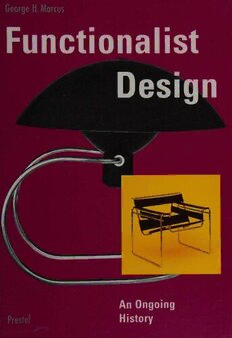
Functionalist Design: An Ongoing History (Architecture & Design S.) PDF
87 Pages·1995·23.841 MB·English
Most books are stored in the elastic cloud where traffic is expensive. For this reason, we have a limit on daily download.
Preview Functionalist Design: An Ongoing History (Architecture & Design S.)
Description:
In this copiously illustrated volume, George H. Marcus presents a corrective history of functionalism, the aesthetic that defined the course of progressive design in this century, and his work is particularly illuminating with regard to the use of color in architecture and design. Tracing the development of functionalism from Victorian times, Marcus establishes its basis as socially beneficial and without allegiance to style, material, or context. All that changed as the definition of functionalism narrowed and became closely identified with metal furniture, industrial materials, and austerity in the 1930s and was subsequently redefined simply as a modernist style. With the advent of postmodernism, functionalism has been overshadowed, but its classic designs - the metal furniture of Mies van der Rohe, Le Corbusier, and Marcel Breuer - are now becoming broadly accessible, fulfilling social goals promoted over a century ago. The profileration of these designs today, however, belies the difficulties of bringing them into production. Based on his archival research, Marcus documents the history of their manufacture and sheds new light on the creation and dissemination of some of the most important examples of modern design.
See more
The list of books you might like
Most books are stored in the elastic cloud where traffic is expensive. For this reason, we have a limit on daily download.
